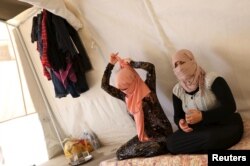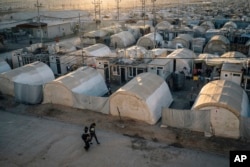Ashwaq Haji Hami, a Yazidi from Iraq's Sinjar region, still shudders at the memory of being accosted on a street in Germany by the man who had held her as a sex slave for six months.
Hami was 15 years old when she was kidnapped along with dozens of family members — including five brothers, sisters, uncles and cousins — during the Islamic State group's genocidal rampage through the Sinjar region in 2014, she recounted in a Skype interview with VOA's Kurdish service.
At least 10,000 Yazidis were either killed or abducted during the attack, according to the United Nations. Hami was among the more than 6,400 people, mostly women and children, who were enslaved rather than killed.
Safety shattered
Purchased by an IS militant she knew as Abu Hammam al-Iraqi, she was forced to live with him for six months before escaping and eventually making her way to what she thought was a secure new home in Germany.
But, she told VOA, the illusion of safety was shattered in 2016 when a man she thought to be Abu Hammam saw her on a street and followed her home. Finding it hard to believe such a man could have been allowed to live in Germany, she put her fears aside and decided she must have been mistaken.
But then this year, she saw him again, and this time there was no doubt. Hami said Abu Hammam pulled up next to her in a white car and tried to talk to her.
"He spoke in German and asked me if I was Ashwaq. I denied [it]. He said that I am Ashwaq," Hami said.
Hami reported the incident to German authorities, who confirm they are investigating but say they have been unable to find Abu Hammam and doubt that is even his real name.
Comfort of family
Terrified of encountering him again, Hami returned to the Kurdistan area of Iraq, where she still fears for her safety but enjoys the comfort of being close to her family.
"Half of Abu Hammam's family live in Baghdad, and he lives in Germany. Being here is not safer compared to Germany, but at least if anything bad happens to me, I will be with my family and not by myself," Hami said.
"During my captivity in Iraq, he always used to threaten me and tell me that he would follow me wherever I go," she added.
Hami added that she is not alone. She said other Yazidi women in Germany have also seen their former IS captors but have not come forward because they are too frightened and doubt that anyone would believe them.
German investigation
That is not so, VOA was told by Frauke Koehler, spokesperson for federal prosecutors at the Federal Court of Justice in Germany.
Koehler emphasized in an interview that German officials are taking Hami's claims seriously and will carry out a thorough investigation. But, she said, the investigation is hampered because Hami returned to Iraq without providing "precise information" that would help identify her former captor.
"The federal prosecutor would like to have questioned the witness [Hami]. However, the witness had already left Germany when the federal prosecutor's office had taken over the investigation in June 2018," Koehler said.
"Even the name [Abu Hammam] could not be traced back to a real person [living in Germany]," Koehler said, adding that the collection of evidence from traumatized victims is always challenging.
If the man is ever found, however, Hami says she is ready to return to Germany to testify against him.
"I am ready to confront this man in court. I will do whatever it takes to have justice, even if my follow-up of the issue takes 1,000 years," she said.
Genocide
The trauma of the 2014 attack remains fresh in the minds of most Yazidis, members of a religious minority whom the IS extremists regarded as "devil worshippers" who must either renounce their religious views or die.
The United States, United Nations, European Union and Canada, among others, maintain that the assault on their homeland four years ago this month amounted to genocide.
The U.N. agency has said the Yazidi situation remains desperate and that the perpetrators have not been brought to justice, despite having been driven out of most of Iraq and Syria.
"The ideology of [IS] can only be truly defeated if survivors receive justice and redress for the crimes they have suffered, and reconciliation can only occur if the missing are found," Pramila Patten, U.N. special representative on sexual violence in conflict, said earlier this month.
Yazidi rights groups estimate 3,000 women and children remain missing, while thousands live under dire conditions in refugee camps.














